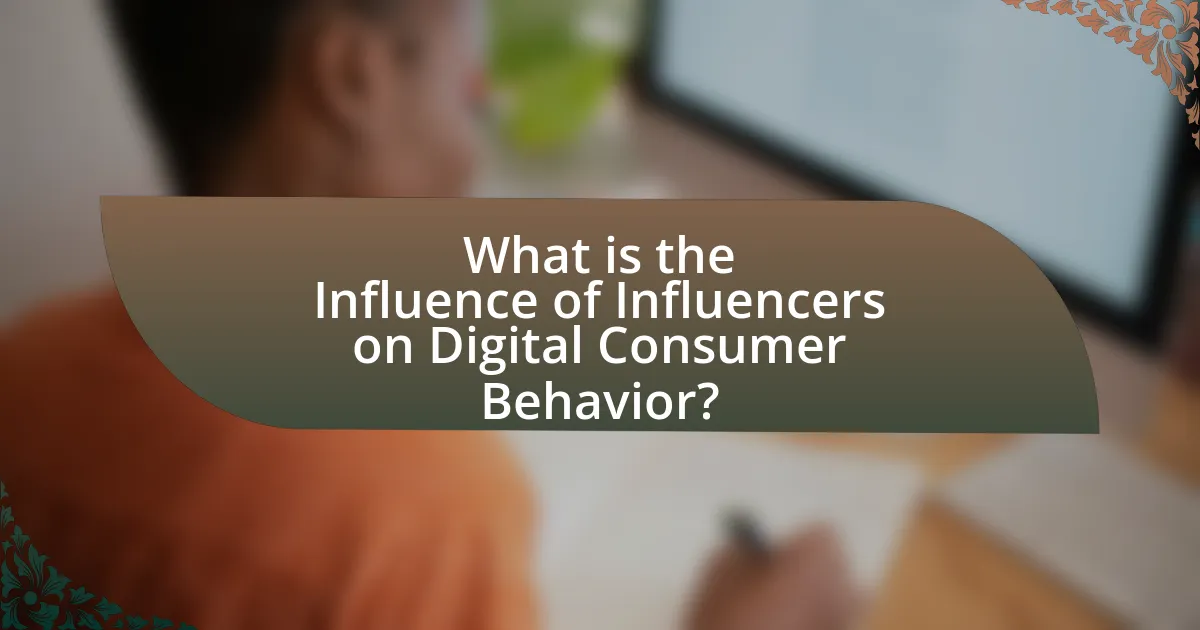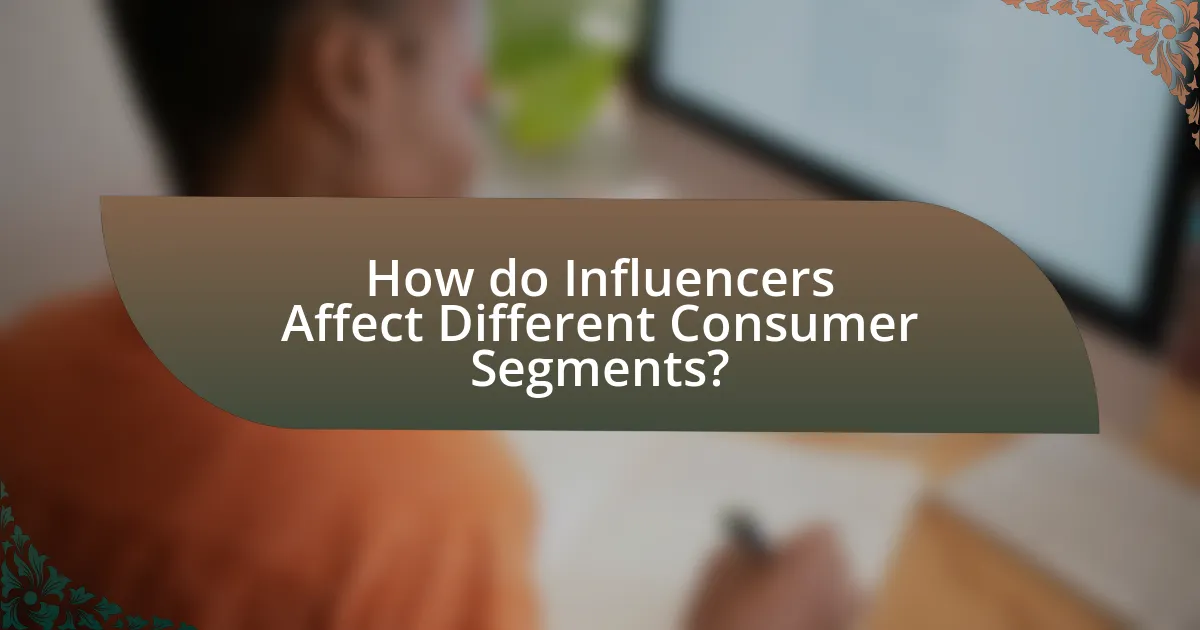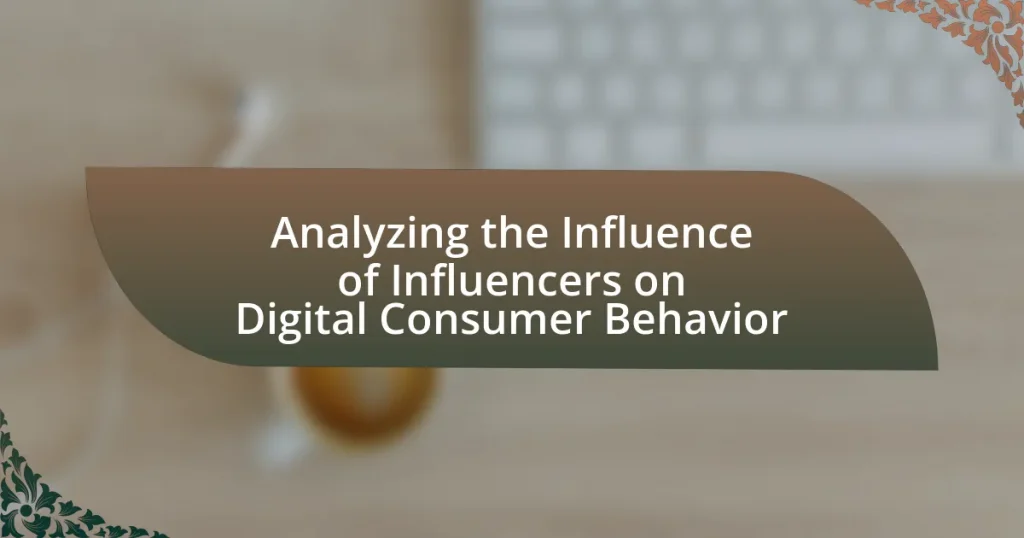The article analyzes the influence of influencers on digital consumer behavior, highlighting their significant role in shaping purchasing decisions and brand perceptions. It presents research indicating that 49% of consumers rely on influencer recommendations, with a notable trust shift towards influencers over traditional celebrities, particularly among younger demographics. The article explores the psychological mechanisms at play, such as social proof and authority, and examines how social media platforms facilitate influencer marketing. Additionally, it discusses the characteristics of successful influencers, the impact of demographic factors on consumer responses, and the challenges and ethical considerations brands face in influencer partnerships.

What is the Influence of Influencers on Digital Consumer Behavior?
Influencers significantly shape digital consumer behavior by affecting purchasing decisions and brand perceptions. Research indicates that 49% of consumers rely on influencer recommendations when making purchase decisions, highlighting their role in driving consumer trust and engagement. Additionally, influencers create a sense of community and authenticity, which enhances consumer loyalty and encourages brand advocacy. This influence is further supported by a study from the Digital Marketing Institute, which found that 70% of teenagers trust influencers more than traditional celebrities, demonstrating a shift in consumer trust dynamics.
How do influencers shape consumer perceptions and decisions?
Influencers shape consumer perceptions and decisions by leveraging their credibility and relatability to create trust among their followers. This trust leads consumers to view the influencer’s recommendations as more authentic compared to traditional advertising. Research indicates that 49% of consumers depend on influencer recommendations for their purchasing decisions, highlighting the significant impact influencers have on consumer behavior. Additionally, influencers often curate content that resonates with their audience’s values and interests, further reinforcing their influence. This dynamic is supported by a study published in the Journal of Marketing Research, which found that consumers are more likely to engage with brands endorsed by influencers they follow, demonstrating the effectiveness of influencer marketing in shaping consumer choices.
What psychological mechanisms are at play in influencer marketing?
Influencer marketing leverages several psychological mechanisms, including social proof, authority, and the principle of reciprocity. Social proof occurs when consumers look to influencers as a benchmark for acceptable behavior and choices, leading them to trust products endorsed by these figures. Authority is established when influencers are perceived as experts or credible sources in their niche, which enhances their persuasive power. The principle of reciprocity suggests that when influencers provide value, such as informative content or entertainment, consumers feel compelled to reciprocate by engaging with or purchasing the promoted products. Research indicates that 70% of teenagers trust influencers more than traditional celebrities, highlighting the effectiveness of these psychological mechanisms in shaping consumer behavior.
How do social proof and authority affect consumer trust in influencers?
Social proof and authority significantly enhance consumer trust in influencers. Social proof, such as follower counts, likes, and positive comments, signals to consumers that others value the influencer’s opinions, thereby increasing credibility. For instance, a study published in the Journal of Marketing Research found that consumers are more likely to trust and follow recommendations from influencers with higher engagement metrics, as these metrics serve as indicators of popularity and reliability. Authority, derived from expertise or established reputation, further solidifies this trust; consumers are inclined to believe influencers who demonstrate knowledge in their niche. Research by the Pew Research Center indicates that 70% of social media users trust influencers who are perceived as experts in their field, reinforcing the idea that both social proof and authority are crucial in shaping consumer perceptions and trust in influencers.
What role do social media platforms play in influencer marketing?
Social media platforms serve as the primary channels for influencer marketing, enabling influencers to reach and engage with their audiences effectively. These platforms provide tools for content creation, audience targeting, and analytics, which facilitate the promotion of products and services through authentic endorsements. For instance, Instagram, with over 1 billion monthly active users, allows influencers to share visual content that resonates with their followers, driving brand awareness and consumer trust. Additionally, platforms like TikTok have rapidly gained popularity for their short-form video content, which can lead to viral marketing campaigns. The effectiveness of influencer marketing on social media is supported by a study from the Digital Marketing Institute, which found that 49% of consumers depend on influencer recommendations when making purchase decisions.
Which platforms are most effective for influencer engagement?
Instagram and TikTok are the most effective platforms for influencer engagement. Instagram boasts over 1 billion monthly active users, with 90% of users following at least one business, making it a prime space for influencer marketing. TikTok, with its rapid growth, has over 1 billion monthly active users as well, and its algorithm promotes high engagement rates, particularly among younger demographics. Studies show that content on TikTok can achieve engagement rates exceeding 17%, significantly higher than other platforms. These statistics underscore the effectiveness of Instagram and TikTok in fostering influencer engagement.
How do algorithms impact the visibility of influencer content?
Algorithms significantly impact the visibility of influencer content by determining which posts are shown to users based on engagement metrics, user preferences, and content relevance. Social media platforms like Instagram and TikTok utilize algorithms that prioritize content with higher engagement rates, meaning posts from influencers that receive more likes, comments, and shares are more likely to be displayed prominently in users’ feeds. For instance, a study by Hwang and Zhang (2018) found that algorithmic curation can lead to a 50% increase in visibility for content that aligns with user interests and engagement patterns. This algorithm-driven visibility directly influences how effectively influencers can reach their target audience and drive consumer behavior.
What are the key characteristics of successful influencers?
Successful influencers possess authenticity, engagement, and niche expertise. Authenticity builds trust with their audience, as consumers are more likely to follow individuals who present themselves genuinely. Engagement is crucial; successful influencers actively interact with their followers, fostering a sense of community and loyalty. Niche expertise allows them to provide valuable content tailored to specific interests, making them credible sources in their field. Research indicates that 92% of consumers trust recommendations from individuals over brands, highlighting the importance of these characteristics in influencing digital consumer behavior.
How does authenticity influence an influencer’s effectiveness?
Authenticity significantly enhances an influencer’s effectiveness by fostering trust and relatability among their audience. When influencers present themselves genuinely, they create a stronger emotional connection with their followers, which leads to higher engagement rates. Research indicates that 86% of consumers consider authenticity important when deciding which brands to support, demonstrating that authentic influencers can drive consumer behavior more effectively than those perceived as inauthentic. This trust translates into increased brand loyalty and higher conversion rates, as audiences are more likely to act on recommendations from influencers they perceive as real and relatable.
What types of content resonate most with digital consumers?
Digital consumers resonate most with authentic, relatable, and visually engaging content. Research indicates that 79% of consumers prefer content that feels genuine and reflects real-life experiences, as highlighted in a study by Stackla, which found that 86% of consumers say authenticity is important when deciding what brands they like and support. Additionally, video content, particularly short-form videos, has gained significant traction, with platforms like TikTok reporting that users engage more with video content than any other format. This preference for authenticity and visual engagement drives consumer trust and loyalty, making it crucial for brands to focus on these content types to effectively connect with their audience.

How do Influencers Affect Different Consumer Segments?
Influencers significantly affect different consumer segments by shaping their purchasing decisions and brand perceptions. For instance, millennials and Gen Z consumers are particularly influenced by social media personalities, with 70% of teens trusting influencers more than traditional celebrities, according to a 2021 survey by Morning Consult. This demographic often seeks authenticity and relatability, leading them to engage with brands endorsed by influencers they follow. Conversely, older consumer segments, such as Gen X and baby boomers, may respond more to influencers who convey expertise and authority in specific niches, such as finance or health, as they prioritize credibility. Research from the Digital Marketing Institute indicates that 49% of consumers rely on influencer recommendations for product discovery, highlighting the varying impact across age groups and interests. Thus, influencers tailor their messaging to resonate with specific consumer segments, ultimately driving engagement and sales.
What demographic factors influence the effectiveness of influencers?
Demographic factors such as age, gender, income level, and geographic location significantly influence the effectiveness of influencers. For instance, younger audiences, particularly those aged 18-24, are more likely to engage with social media influencers, as evidenced by a study from the Pew Research Center, which found that 71% of this age group uses Instagram, a platform heavily populated by influencers. Gender also plays a crucial role; female influencers tend to have higher engagement rates among female audiences, while male influencers resonate more with male consumers. Additionally, income level affects purchasing decisions influenced by social media; higher-income individuals may respond differently to luxury brand endorsements compared to lower-income individuals who may prioritize affordability. Geographic location can impact cultural relevance, as influencers who align with local values and trends are more effective in specific regions.
How do age and gender impact consumer responses to influencers?
Age and gender significantly impact consumer responses to influencers, as different demographics exhibit varying levels of trust and engagement with influencer content. Research indicates that younger consumers, particularly those aged 18-24, are more likely to follow and engage with influencers, valuing authenticity and relatability in their endorsements. In contrast, older consumers tend to prefer influencers who demonstrate expertise and credibility, often gravitating towards those who align with their values and lifestyle.
Gender also plays a crucial role; studies show that female consumers are generally more responsive to influencer marketing, particularly in beauty and fashion sectors, where they seek recommendations and validation from peers. Male consumers, however, may respond more favorably to influencers in technology and gaming, where expertise is prioritized over personal connection. This divergence in response patterns highlights the necessity for brands to tailor their influencer strategies based on the age and gender of their target audience to maximize effectiveness.
What role does cultural background play in influencer marketing effectiveness?
Cultural background significantly influences influencer marketing effectiveness by shaping consumer perceptions and engagement. Influencers who resonate with the cultural values, norms, and preferences of their audience tend to foster stronger connections, leading to higher trust and credibility. For instance, a study published in the Journal of Advertising Research found that culturally congruent messaging can increase consumer purchase intentions by up to 50%. This demonstrates that understanding cultural nuances is crucial for brands aiming to optimize their marketing strategies and enhance their overall impact in diverse markets.
How do influencers impact purchasing behavior across various industries?
Influencers significantly impact purchasing behavior across various industries by shaping consumer perceptions and driving engagement. Their ability to create relatable content fosters trust and authenticity, which can lead to increased brand loyalty and higher conversion rates. For instance, a study by the Digital Marketing Institute found that 49% of consumers depend on influencer recommendations when making purchasing decisions. Additionally, influencers often have niche audiences, allowing brands to target specific demographics effectively, which enhances the likelihood of purchase. This targeted approach is evident in the beauty industry, where influencers can drive sales by showcasing products to their followers, resulting in a reported 11 times higher return on investment compared to traditional advertising methods.
Which industries see the highest conversion rates from influencer marketing?
The industries that see the highest conversion rates from influencer marketing include fashion, beauty, and health and wellness. According to a study by Influencer Marketing Hub, the fashion industry boasts a conversion rate of 1.8%, while beauty brands achieve a conversion rate of 1.6%. Health and wellness products also perform well, with conversion rates around 1.5%. These statistics demonstrate that influencer marketing is particularly effective in these sectors, leveraging the trust and engagement influencers have with their audiences to drive sales.
How do influencers affect brand loyalty and repeat purchases?
Influencers significantly enhance brand loyalty and drive repeat purchases by leveraging their credibility and relatability to create emotional connections with consumers. Research indicates that 49% of consumers depend on influencer recommendations for their purchasing decisions, which fosters trust in the brand being promoted. This trust translates into increased brand loyalty, as consumers are more likely to remain loyal to brands endorsed by influencers they admire. Additionally, a study by the Digital Marketing Institute found that 70% of teenagers trust influencers more than traditional celebrities, highlighting the effectiveness of influencers in cultivating a loyal customer base. Consequently, brands that collaborate with influencers often experience higher rates of repeat purchases, as consumers feel a personal connection to the brand through the influencer’s endorsement.

What are the Challenges and Ethical Considerations in Influencer Marketing?
The challenges and ethical considerations in influencer marketing include authenticity, transparency, and the potential for misleading information. Authenticity is crucial as consumers increasingly demand genuine endorsements; studies show that 86% of consumers consider authenticity important when deciding which brands to support. Transparency is mandated by regulations such as the Federal Trade Commission guidelines, which require influencers to disclose paid partnerships clearly. Failure to do so can lead to legal repercussions and damage to brand reputation. Additionally, the potential for misleading information arises when influencers promote products without adequate knowledge or experience, which can result in consumer distrust and negative brand perception. These factors highlight the need for ethical practices in influencer marketing to maintain consumer trust and comply with legal standards.
What are the potential pitfalls of influencer partnerships?
The potential pitfalls of influencer partnerships include misalignment of brand values, lack of authenticity, and ineffective audience targeting. Misalignment occurs when the influencer’s persona or values do not resonate with the brand, leading to consumer distrust; for example, a luxury brand partnering with a budget-focused influencer may confuse consumers. Lack of authenticity can arise when influencers promote products they do not genuinely use or believe in, which can result in negative backlash, as seen in cases where followers express disappointment over perceived insincerity. Ineffective audience targeting happens when brands collaborate with influencers whose followers do not match the brand’s target demographic, leading to low engagement and poor return on investment; research indicates that 70% of marketers believe audience alignment is crucial for successful influencer campaigns.
How can brands avoid influencer fraud and misrepresentation?
Brands can avoid influencer fraud and misrepresentation by conducting thorough vetting of influencers before collaboration. This includes analyzing their follower demographics, engagement rates, and authenticity of their audience. Research indicates that 49% of marketers have encountered influencer fraud, highlighting the importance of due diligence. Tools like social media analytics platforms can provide insights into an influencer’s real engagement metrics, helping brands identify potential red flags. Additionally, establishing clear contracts that outline expectations and deliverables can mitigate risks associated with misrepresentation.
What are the consequences of negative influencer behavior on brands?
Negative influencer behavior can significantly harm brands by damaging their reputation, eroding consumer trust, and leading to decreased sales. When influencers engage in controversial or unethical actions, brands associated with them often face backlash from consumers, resulting in negative publicity. For instance, a study by the Digital Marketing Institute found that 70% of consumers are less likely to purchase from a brand after a negative incident involving an influencer. Additionally, brands may experience a decline in engagement on social media platforms, as followers may unfollow or criticize the brand for its association with the influencer. This can lead to long-term financial repercussions, as brands may struggle to recover their image and regain consumer confidence.
How can brands ensure ethical practices in influencer marketing?
Brands can ensure ethical practices in influencer marketing by establishing clear guidelines for transparency and authenticity. This includes requiring influencers to disclose paid partnerships and sponsorships, which aligns with Federal Trade Commission (FTC) regulations that mandate such disclosures to protect consumers from misleading advertising. Additionally, brands should conduct thorough vetting of influencers to ensure their values align with the brand’s mission, thereby fostering genuine connections with audiences. Research indicates that 86% of consumers consider transparency important when engaging with influencers, highlighting the necessity for brands to prioritize ethical standards in their marketing strategies.
What guidelines should brands follow when collaborating with influencers?
Brands should follow clear guidelines when collaborating with influencers to ensure effective partnerships. First, brands must select influencers whose audience aligns with their target demographic, as this increases the likelihood of engagement and conversion. Research indicates that 49% of consumers depend on influencer recommendations for their purchasing decisions, highlighting the importance of relevance in influencer selection.
Next, brands should establish transparent communication regarding expectations, deliverables, and compensation to foster a positive working relationship. A study by the Digital Marketing Institute found that 70% of influencers prefer clear guidelines to avoid misunderstandings.
Additionally, brands must ensure compliance with advertising regulations, such as the Federal Trade Commission’s guidelines, which require influencers to disclose paid partnerships. This transparency builds trust with the audience and maintains brand integrity.
Finally, brands should monitor and analyze the performance of influencer campaigns through metrics like engagement rates and conversion tracking to assess effectiveness and optimize future collaborations. According to a report by Influencer Marketing Hub, businesses earn an average of $5.78 for every dollar spent on influencer marketing, emphasizing the need for performance evaluation.
How can transparency enhance consumer trust in influencer marketing?
Transparency enhances consumer trust in influencer marketing by providing clear information about sponsorships and partnerships. When influencers disclose their relationships with brands, it allows consumers to make informed decisions, fostering a sense of authenticity. Research indicates that 61% of consumers are more likely to trust influencers who are transparent about their affiliations, as found in a study by the Digital Marketing Institute. This trust is crucial, as it directly influences purchasing decisions and brand loyalty, demonstrating that transparency is essential for effective influencer marketing.
What best practices should brands adopt for effective influencer marketing?
Brands should adopt a strategic approach to influencer marketing by selecting influencers whose values align with their brand and audience. This alignment ensures authenticity, which is crucial for building trust with consumers. Research indicates that 92% of consumers trust recommendations from individuals over brands, highlighting the importance of genuine partnerships. Additionally, brands should focus on creating clear and measurable campaign goals, such as engagement rates or conversion metrics, to evaluate the effectiveness of their influencer collaborations. Utilizing data analytics tools can further enhance targeting and performance tracking, allowing brands to optimize their strategies based on real-time feedback.
How can brands measure the ROI of influencer campaigns?
Brands can measure the ROI of influencer campaigns by analyzing key performance indicators (KPIs) such as engagement rates, conversion rates, and overall sales attributed to the campaign. By tracking metrics like likes, shares, comments, and click-through rates on posts made by influencers, brands can assess the level of audience interaction. Additionally, using unique discount codes or affiliate links allows brands to directly attribute sales to specific influencers, providing concrete data on financial returns. A study by Influencer Marketing Hub found that businesses earn an average of $5.78 for every dollar spent on influencer marketing, highlighting the potential profitability of these campaigns.
What strategies can enhance the long-term effectiveness of influencer partnerships?
To enhance the long-term effectiveness of influencer partnerships, brands should focus on building authentic relationships with influencers. Establishing genuine connections fosters trust, which is crucial for sustained engagement and credibility. Research indicates that 92% of consumers trust recommendations from individuals over brands, highlighting the importance of authenticity in influencer marketing. Additionally, brands should prioritize aligning their values with those of the influencers, as this alignment can lead to more cohesive messaging and a stronger emotional connection with the audience. Regularly evaluating partnership performance through metrics such as engagement rates and conversion tracking can also help brands refine their strategies and ensure ongoing effectiveness.




